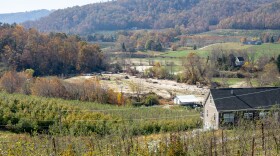Imported red fire ants are known for building large mounds that get in the way of everything from lawn mowing to crop harvesting. They swarm aggressively when disturbed, and defend themselves with painful, venomous stings.
The invasive species first made its way into Southeastern North Carolina in the late '50s, and ever since, the ants have been slowly, but surely, spreading north and west throughout the state.
Fire ants can increase their territory by sending off young queens, who fly up to ten miles away to start new colonies. But, as N.C. State Extension Specialist Mike Waldvogel explains, they cover a lot more ground by hitching a ride in plants and soil.
“When we see the kind of growth that we’ve seen in North Carolina and other states, that’s often a recipe for fire ants spread,” he said. “When we start landscaping those areas, [it’s] kind of like we’re our own worst enemy, because we bring them there and they start their own infestations locally.”
To limit their spread throughout the South, the U.S. Department of Agriculture enacted a quarantine in 1958. Agricultural goods like sod, hay, and nursery plants can’t be moved from infested areas to non-infested areas unless growers can document they’ve taken steps to kill any ants that might be carried along.

In North Carolina, at least 75 counties report fire ant populations. As fire ants’ range expands, so does the quarantine zone. This year, all of Orange, Davidson and Vance counties were added to the zone.
Dana Massey runs Plantworks Nursery, growing wholesale ornamental plants in Rougemont, at the northeastern edge of Orange County. She says in the past, the quarantine line that bisected the county ran well south of her 40-acre operation. Massey got word last fall that was about to change.
“We were just outside the zone for years,” she said. “I really wasn’t aware how much it impacted the growers in the areas that it was already there until it happened to us.”
Plantworks Nursery ships plants up and down the East Coast, to areas well outside the quarantine zone. To comply with state and federal regulations, Massey has had to add a complex step in her planting process, hiring a third party company to mix insecticide into her potting materials after it has left the distributor but before it arrives at her nursery. It adds time, cost and a new degree of uncertainty.
“We felt pretty confident with what we were doing and how we were doing it, and this just threw a monkey wrench in it, in that we just don’t have as much control as we used to,” she said. “Some of these things are out of our hands.”
It’s not just plant growers affected by the spread of the ants. Waldvogel said it’s a growing concern for cattle and dairy farmers, as the ants can injure young livestock.
Researchers had long hoped the cold weather in the North Carolina mountains would halt the ant advance, but colonies have taken hold in the western tip of the state. Waldvogel said the ants just burrow deeper underground to survive the winter.
Human activity has helped the fire ant spread to 75 counties in the state. Waldvogel said it will take concerted effort to slow the advance into the remaining 25.
“I think the quarantine has helped slow it, but it’s not going to stop it, because it does rely on our cooperation in making sure it works well,” said Waldvogel.









